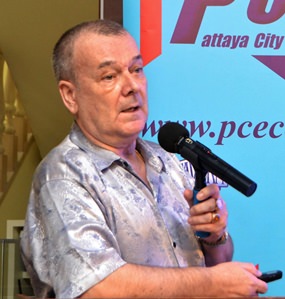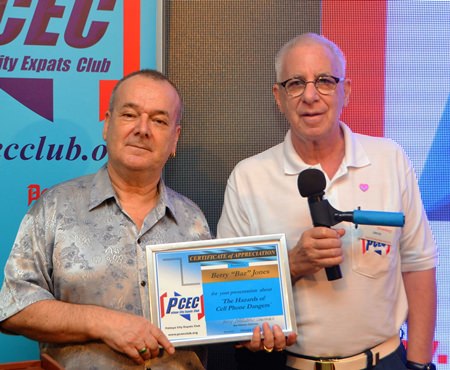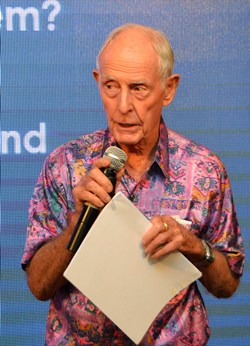Is your cell phone hazardous? What are the dangers? These questions were posed by Barry “Baz” Jones, the guest speaker at the February 14 meeting of the Pattaya City Expats Club. Barry said that while he was working in the oil & gas/petrochemical industry, he was asked to do a study of the dangers of cell phones with respect to them being a source of ignition in that industry.
Barry said it has been thought that energy (electromagnetic waves) from cell phone can ignite gas. He referenced a video that shows gasoline igniting at a gas station after the gas station attendant answers his cell phone. According to Barry, there is evidence to suggest that the use of a cell phone is able to generate a static charge on a person’s body. When that person touches the car a spark can be generated. However, he doesn’t think the cell phone is the cause of the ignition; he thinks it’s caused by static electricity, which can be generated by friction between a person’s clothes and a car seat. He says it’s more common in young people than older people because older people usually grab the car frame to get out of car, thereby dissipating the static electricity. And it happens more with women because they keep their money in their purse, on the passenger seat, so they have to go back into car to get the money, and that builds up more friction.
 Baz Jones describes his research into the hazards and dangers of cell phone use along with the conclusions he reached. Baz also provided his PCEC audience with some interesting statistics on cell phone use and how it led to a new word, ‘phubbing’ which refers to ignoring a partner or companion by continuously using their smart phone.
Baz Jones describes his research into the hazards and dangers of cell phone use along with the conclusions he reached. Baz also provided his PCEC audience with some interesting statistics on cell phone use and how it led to a new word, ‘phubbing’ which refers to ignoring a partner or companion by continuously using their smart phone.
He mentioned that he was startled by certain other factors which came to light during his research. “I am the first to agree that I am by no means an expert on electromagnetic radiation, but I am compelled to listen to the experts,” he stated. Further, it is estimated that 75% of the world’s 7.4 billion population has access to a cell phone, while about 3 billion people don’t even have access to potable water.
Barry says it is estimated that 54% of the population in the UK suffer from nomophobia, an abnormal and irrational fear of being without one’s mobile device, and of being unable to communicate using one’s mobile device. A study found that 58% of smart phone users don’t go more than one hour without checking their phone. This has given rise to a new word, albeit slang, in the English language: phubbing. The word – coined in 2013 – refers to ‘snubbing’ a partner to look at a smart phone, and is becoming an epidemic. Researchers also believe it can lead to depression.
According to Barry, the World Health Organization (WHO) believes that there is evidence to suggest that keeping a cell phone close to your person and using it more than ten minutes a day is linked to cancer. He said cell phones emit microwave radiation, and researchers believe that just as an opera singer can produce sound waves at a frequency that will shatter a wine glass, so the erratic nature of a cell phone’s signal, its frequency, and its ability to disrupt resonance can interfere with DNA repair, and possibly damage the brain blood barrier.
 MC Richard Silverberg presents Baz Jones with the PCEC’s Certificate of Appreciation for his interesting and informative presentation on the dangers and hazards of cell phone use.
MC Richard Silverberg presents Baz Jones with the PCEC’s Certificate of Appreciation for his interesting and informative presentation on the dangers and hazards of cell phone use.
What’s more, your phone doesn’t produce a signal only when you are speaking on it. Periodically your phone emits a signal, at full power, looking for a cell-phone tower, and you are not aware that it is doing so! In addition, smart phones use lithium ion batteries, which are very susceptible to change in temperature. He said it is not that unusual for cell phone batteries to spontaneously ignite. He mentioned that insurance companies will not cover any person who may be employed in the manufacture and or sale of cell-phones for any ailment thought to have been caused by cell-phone radiation.
 Member Richard Smith informs PCEC members and guests about some upcoming events of interest including Special Interest Group meetings, several wine events, and arrangements he is making for transportation of those that plan to attend Pattaya’s Pink Polo event.
Member Richard Smith informs PCEC members and guests about some upcoming events of interest including Special Interest Group meetings, several wine events, and arrangements he is making for transportation of those that plan to attend Pattaya’s Pink Polo event.
Also, he said, “Consider the little-noticed bit of legalese that comes in the safety manual for Apple’s iPhone 4: When using iPhone near your body for voice calls or for wireless data transmission over a cellular network, keep iPhone at least 15 mm (5/8 inch) away from the body, and only use carrying cases, belt clips, or holders that do not have metal parts and that maintain at least 15 mm (5/8 inch) separation between iPhone and the body.”
Yet where do many people generally keep their smart phones? In their pockets, their waist band; their bra, or on the dashboard of their car. Barry showed several photos of people who had developed tumours or severe burns where they carried their smart phones. He also showed several gruesome photos of people who had died in their sleep because they went to bed with their phone under their pillow or using head phones.
We will not stop using cell phones, so what should we do? Barry gave several “don’ts:” Do not keep a phone under your pillow; do not sleep when using your head phones, especially when charging; do not charge your phone overnight; do not keep a phone in your pocket; your bra; on your dash or anywhere it can get hot; and be a responsible parent and don’t give your child a cell-phone. On the other hand, do keep your phone on your desk and use the speaker or hands-free set.
At the conclusion of the presentation, MC Richard Silverberg brought everyone up to date on Club and other events and called on Anne Ensell to conduct the Open Forum, where questions are asked and answered about Expat living in Thailand, especially Pattaya.
For more information on the PCEC’s many activities, visit their website at www.pcecclub.org.




